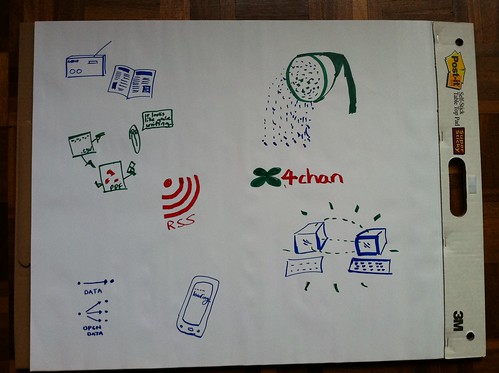I had a fun day yesterday at the Civil Service Fast Stream conference, which was focusing on big society type stuff. I was running a session on open government, with a concentration on open data.
As a bit of fun, while we were talking I asked the members of the group to draw what occurred to them when thinking about open data.
If you click the photo, you’ll be taken to the original on Flickr, which I have annotated with what I remember of the descriptions from the artists.
Once again, in a conversation about open data, I ended up coming across as being somewhat sceptical.
I’m all in favour of transparency in government, and I’m also very much in favour of public services publishing their information in accessible formats.
What I’m not so sure about are some of the claims made for the potential of open data to transform government, and its relationship with citizens.
I can’t see where the business model is for third parties to create applications based on this data, unless government itself pays. I’m also unconvinced that there are enough people around with the skills (and indeed the inclination) to either be effective armchair auditors or civic hackers all over the country.
I suspect the biggest users of open data will end up being journalists, and the work that newspapers such as The Guardian are already doing seems to support this. It’s a good thing, but hardly sees a great redrawing of the traditional ways of doing things.
The other area where I can see benefit coming from an openness around information assets and a different attitude towards data is in the use of it by government itself. I agree with Andrea DiMaio that if open government is to become a reality, it is going to happen through the actions of public servants themselves, rather than from activists on the outside.
So, transparency is important. There are opportunities around open data, as well as challenges. Right now, though, I struggle to see how dramatic change will happen as a result of publishing data.
I’d be very happy to be proven wrong, though!






Open data intiatives are primarily intended to be a smoke screen to hide a lack of transparency in other areas. Are FOIA responses backlogged so badly even the NSA is embarresed? Roll out a web site with a list of contract awards that no one really cares about. Have high ranking officials been caught lying to Congress about gun running? Put up a a searchable data base of misdomeanor investigations sorted by zip code. Is the press complaining about being stonewalled by your press secretary and being threatened with retaliation by your communications directors? Announce yet another web site listing government spending (albeit incomplete but who’ll notice?) Are people wondering why your award for open government was presented in meeting closed to the press who had been complaining about lack of openness for months? Roll out another accessable data base. It doesn’t matter on what just call it open and pat yourself on the back.
People outside of goventment will take open data seriously when people inside of government start using it as a tool rather than an excuse.